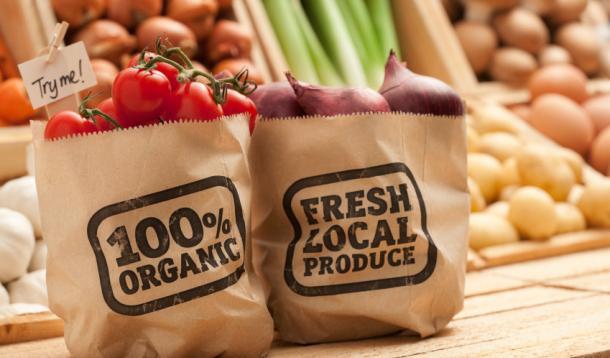
For as long as I can remember, there have been conflicting messages around whether or not to buy organic foods or non-organic (conventionally grown) foods. I remember back in University, even my professors had differing opinions, based on varying studies and evolving science.
Here's the thing: Nutritional Science changes daily.
And I really don't foresee that we will have conclusive facts or guidelines when it comes to the organic/conventional debate in the near future. The good thing is, we're learning more and more as time goes on. The recent study/review published in the Annals of Internal Medicine (the one that has created all of the buzz) states that "the published literature lacks strong evidence that organic foods are significantly more nutritious than conventional foods." It also claims that "organic foods may reduce exposure to pesticide residues and antibiotic-resistant bacteria."
Didn't we already know that?!
Because this paper is a review of several other studies that have been done over the years, it represents information that we already knew. There isn't any new earth shattering science here, despite the huge media buzz. It's hard for us Dietitians and other health professionals to feel confident in what we recommend to clients when the science that we have to draw from is inconclusive. All we can do is take the information that we have and translate it into terms that others can understand, to empower them to make the best choice for themselves and their families. It really comes down to personal choice.
My opinions and thoughts around this subject have evolved and changed over the years with the science. Now that I have a growing family and more knowledge, I do choose to buy some organic foods when I can afford them (and I use the term "can" loosely). I also like to buy as local as possible because supporting local farmers is important to me. If you buy local, your food hasn't travelled as long and will likely retain more nutritional value because of that. That being said, it's hard for most of us in the prairies to have a good variety of fresh, local produce year round, but we can do the best that we can with what is available to us.
I like to use the Environmental Working Groups Dirty Dozen and Clean Fifteen list when it comes to produce because I don't like the idea of consuming chemicals like pesticides, herbicides and fertilizers. Although these lists aren't based on perfect science, at least they provide some guidance to consumers. As Candace Derickx points out in her latest blog post, it can be both frustrating and confusing trying to decide which fruits and veggies to buy for your family!
The effects of pesticides and other chemicals are still largely unknown, but they may be carcinogenic, they may cause disruptions to the nervous system, and they may affect our hormone and endocrine systems. The amounts that are consumed by humans through non-organic produce may be small enough as not to have a harmful effect though.
Who knows?!
When it comes to meats and poultry, much to my thrifty husband's dismay, I do try to buy organic/grass fed most of the time from local farmers. I love chatting with the Farmer at the market about how they raise their animals (without hormones or antibiotics), what they feed them and how they are treated. It just makes me feel good about what I'm buying, eating and feeding my family.
The downside?
Let's start with "the look" that I get from my husband when I return and start unpacking my beautiful cuts of organic meat. And then there is the guilt that feel for spending so much money on food. "I AM a Dietitian" is my usual defensive response. And then I get the "eye-roll."
Sometimes I opt for Superstore's "free-from" line ( a product line that features cuts of meat that are free from hormones and antibiotics) which is a great alternative if you cannot afford organic meats. And let's face it, most of us can't!
When it comes to produce, regardless if you choose to (or can) buy organic or not, eating fruits and vegetables PERIOD is healthy and beneficial. Much healthier than not eating them at all. As this study states, the difference in nutrient composition between organic and conventional produce is likely minimal. Let's go with that. So you're still getting all of the wonderful vitamins, antioxidants, and phytochemicals even if you're not choosing organic. Nobody, in my mind, should feel guilty about buying non-organic fruits and veggies. Just because I choose to spend a tad beyond my means (and piss my husband off) to buy some organic foods, doesn't mean that you should do the same or that I'm a better parent. Buying fruits and veggies of any kind is A GOOD THING.
After all, the only conclusive evidence that we have about this debate is that there is no conclusive evidence.